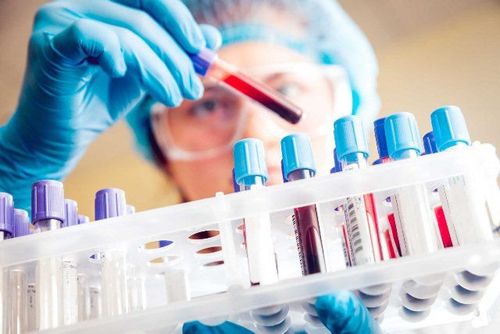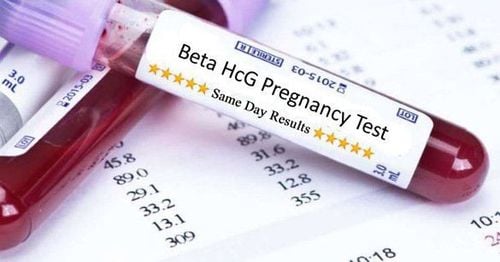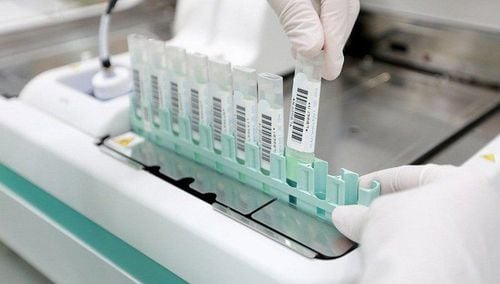This is an automatically translated article.
The Comprehensive Metabolic Panel (CMP) is a test that measures the levels of 14 different chemicals in the body. The test plays a role in assessing the level of metabolism and chemical balance in the body.
1. What is a comprehensive metabolic panel?
The Comprehensive Metabolic Panel (CMP) is a test that measures the levels of 14 different chemicals in the body to assess metabolism and the level of stoichiometry in the body.
Tests are often ordered in cases of routine health check-ups, to monitor chronic conditions, or to determine if a prescribed medication is causing damage to the liver or kidneys. To take the test, you'll need to fast and fast except for water for up to 12 hours beforehand.
A comprehensive metabolic panel can tell you about health conditions in the body including:
Kidney and liver ability to function Blood sugar level Electrolyte level Blood protein level Level of acid and base balance in blood Metabolic capacity in the body.

Bảng trao đổi chất toàn diện có thể cho bạn biết các tình trạng sức khỏe trong cơ thể bạn
2. How is comprehensive metabolic testing done?
The nurse will use a needle to draw blood from the arm vein and pour it into a test tube. The blood draw procedure usually takes less than 5 minutes to complete.
You may feel a slight sting as the needle goes in and out of your skin, bruising at the injection site may occur, but most symptoms should go away quickly.
3. Factors affecting comprehensive metabolic panel results
In the test results table there will usually be a reference column and an actual result column. If the result is within the reference range it is normal, if it is higher or lower it is considered abnormal.
There are many factors that affect the results of a comprehensive metabolic panel, such as:
Current medications such as steroids, insulin and hormones Eat or drink before the test Exercise before the test Breaks blood cells during sample collection and processing If any of the readings are not as expected, you can ask your doctor to repeat the test to make sure.

Có nhiều yếu tố ảnh hưởng đến kết quả bảng trao đổi chất toàn diện như: các loại thuốc đang dùng, ăn uống trước khi làm xét nghiệm,...
4. Normal index in comprehensive metabolic panel
4.1. Liver test CMP Indicated liver test indicators include ALP, ALT, AST and bilirubin . The normal ranges for these are as follows:
ALP (alkaline phosphatase): 44 - 147 IU/L ALT (alanine aminotransferase): 7 - 40 IU/L AST (aspartate aminotransferase): 10 - 34 IU/L Bilirubin: 0.3 - 1.9 mg/dL 4.2. CMP kidney test The CMP test checks for two waste products in the kidneys, blood urea nitrogen (BUN) and creatinine . The normal ranges for these two are as follows:
BUN (blood urea nitrogen): 6 - 20 mg/dL Creatinine: 0.6 - 1.3 mg/dL 4.3. Electrolyte test CMP Electrolytes help the body balance fluids, control heart rate and the activities of muscles and brain. Abnormal results may indicate heart disease, kidney disease, or dehydration. The normal range of electrolytes includes:
Sodium: 136 - 145 meq/L Potassium: 3.5 - 5.1 meq/L Chloride: 96 - 106 meq/L CO2: 23 - 29 meq/L. 4.4. The CMP CMP protein test checks for albumin, the main protein made by the liver, and proteins in the blood in general. Protein is important for healthy muscles, bones, blood and organs. Therefore, low blood protein levels can indicate liver or kidney disease or nutritional problems. The normal range of protein is:
Albumin : 3.4 - 5.4 g/dL Total protein : 6.0 - 8.3 g/dL 4.5. CMP blood sugar test High blood sugar levels can be a risk factor for diabetes, warning hypoglycemia, normal range is 70 - 99 mg/dL.
4.6. CMP calcium test Calcium is important for muscles, nerves and hormones. If calcium is abnormal, you may have a hormone imbalance or problems with your kidneys, bones, or pancreas. The normal range for calcium is 8.6 - 10.2 mg/dL.
Please dial HOTLINE for more information or register for an appointment HERE. Download MyVinmec app to make appointments faster and to manage your bookings easily.
Reference sources: Webmd.com, medlineplus.gov












